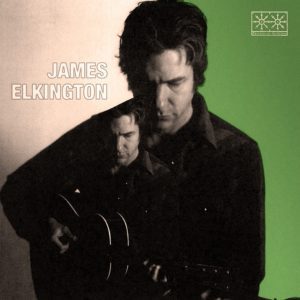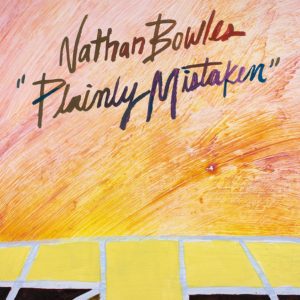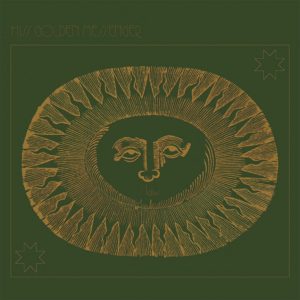After five decades of recording and touring, veteran British songwriter and guitar sage Michael Chapman has finally made what he calls his “American record,” and the aptly titled 50 now stands as his late career masterwork, a moving legacy statement by a legend. Backed by a collaborative group of friends and acolytes—Steve Gunn (who also produced), Nathan Bowles (Pelt), James Elkington (Jeff Tweedy), Jason Meagher (No-Neck Blues Band), Jimy SeiTang (Rhyton), and fellow UK songwriting luminary Bridget St John—Chapman tears into both bold renderings of new songs and radical reinterpretations of material from his revered catalog, the crack band adeptly scaling the same rarefied sonic heights of classic Harvest albums like Fully Qualified Survivor, guided by a true survivor’s instinct, wit, and wisdom. The result is a sublime chiaroscuro self-portrait, more shadow than light, as an invigorated Chapman wrestles with weighty themes of travel, memory, mortality, and redemption, his world-weary whispers assuming the incandescent power of prophecy.
Highlights
- Michael Chapman’s first “American record” was produced by Steve Gunn and features a band comprised of Gunn, Nathan Bowles, James Elkington, Jimy SeiTang, Jason Meagher, and the incomparable Bridget St John. It is his first album with a full band and to include new songs in years.
- Available on 140g virgin vinyl as an LP, with heavy-duty tip-on jacket, printed inner sleeve, lyrics and download code for the entire album and bonus tracks “Rosh Pina” and “Navigation.”
- The deluxe LP package includes tip-on jacket, printed inner sleeve, lyrics, and download card with two bonus tracks; the CD features a gatefold jacket, lyrics, and two non-LP bonus tracks.
- CD edition features heavy-duty gatefold jacket, lyrics, and bonus tracks “Rosh Pina” and “Navigation.”
- PoB artist page for Michael Chapman
Physical format music purchases from the PoB webstore and Bandcamp include digital downloads when feasible. Some, but not all, pre-2023 vinyl pressings also include a download coupon. For digital preorders and high-resolution digital downloads, please visit our Bandcamp page.
Tracklist
A1. “Buddy” 2:54
A2. “Henfight” 3:35
A3. “No Consequence” 2:52
A4. “G.B.” 3:56
A5. “Layman’s Banquet” 3:57
A6. “Carousel” 4:22
B1. “Just for Tomorrow” 3:43
B2. “Angel” 3:58
B3. “Daylight Under My Wing” 2:54
B4. “Right This Time” 3:30
B5. “Bonafide” 5:47
Catalog Number/Release Date
PoB-029 / January 20, 2017
Purchase from PoB above or support via
- Bandcamp (digital/physical)
- Other Online Options (digital/physical)
- Local Record Stores
More from Michael Chapman
| Weight | N/A |
|---|---|
| FORMAT |
Album Narrative
- Photo by Constance Mensh.
- Photo by Constance Mensh.
- Photo by Constance Mensh.
- Photo by Constance Mensh.
- Photo by Constance Mensh.
- Photo by Constance Mensh.
- Photo by Constance Mensh.
- Photo by Carol Kershaw.
- Photo by Carol Kershaw.
- Photo by Carol Kershaw.
I dreamed the blacksnake rode the guitar
Down the river
– Frank Stanford, “The Singing Knives” (1971)
The poems of Frank Stanford manifest a febrile surrealist blues of the American South, especially when exploring his favorite themes of nature, music, and death, a symbolic trinity invoked succinctly by his couplet about a snake adrift on a river, coiled in the soundhole of a guitar-ark. Orphic guitarists (and snakes) recur in Stanford’s work, in which he consistently associates the twin mysteries of mortality and music: “The one in front had a guitar on his back/The other one had a chainsaw,” begins one harrowing passage from “The Snake Doctors.”
The stowaway snake and the guitar-chainsaw duo offer apt metaphors for iconic British songwriter and guitarist Michael Chapman’s music, suffused (like Stanford’s work) with the crooked logic, unfulfilled longing, and existential danger of dreams, but shaded with his own wry sensibility of Northern darkness. He ranks among the innovative midcentury English guitarists—Davey Graham, Richard Thompson, and Michael’s old friend Mike Cooper are others—who transposed the atmosphere and syntax of the blues to a British context through reinvention and deconstruction rather than imitation. But Chapman uniquely deploys his liquid virtuosity and his resonant, slurred Yorkshire burr as vehicles for his mournful (and often barbed) musings on the pleasures and perils of hard living. Like a peaty whiskey (or Bob Dylan), the smoky gravitas of his playing and singing has grown more trenchant and entrenched with age; no one else sounds like him.
It’s difficult not to describe Michael’s long career and his vast, masterful body of work obliquely, by reeling off his musical genealogy, the astounding roll call of collaborators, comrades, and disciples with whom he’s shared stages, studios, and his sturdy songs. His emergence in 1967, alongside Wizz Jones, as a self-taught jazz freak, recovering art-school student, and part-time photography teacher on the Cornish folk circuit preceded a series of classic late 1960s and ’70s albums for Harvest, Deram, and Decca. (But whatever you do, don’t call him a folkie; he feels more kinship with the improvisatory outer orbits of jazz, blues, and the avant-garde.)
A peer of legends like Bert Jansch, John Renbourn, and Roy Harper—but arguably more mercurial and less classifiable over the long haul than any of them—Chapman is probably the only musician in history to have played and recorded with Mick Ronson, Elton John, and Thurston Moore. (True stories: David Bowie enlisted Ronson in the Spiders from Mars as a direct result of his superb playing on Chapman’s Fully Qualified Survivor, John Peel’s favorite album of 1970. Elton John tried to recruit Michael to his band thereafter, but producer Gus Dudgeon interfered.) Following a millennial resurgence and reissue campaigns by the Light in the Attic and Tompkins Square labels, Michael’s songs have recently been covered by Lucinda Williams, Kurt Vile, Hiss Golden Messenger, Meg Baird, and William Tyler, and he has performed and toured with younger devotees including Bill Callahan, Jack Rose, Daniel Bachman, and Ryley Walker. But this litany of comrades and admirers is only one vector by which to chart the undiluted potency of Chapman’s artistry and its deep currents of influence on three generations of musicians.
His new record 50, titled to commemorate fifty years of touring—and released four days before Michael’s seventy-sixth birthday—stands as a formidable monument of retrospection and introspection in his adventurous catalog (last we counted, approaching fifty records.) A return to the gloriously ragged kineticism of Rainmaker (1969), Fully Qualified Survivor (1970), Wrecked Again (1971), and Savage Amusement (1976), Michael’s first “American record”—an elusive goal for decades—embodies his undeniable late career masterpiece. It is his first album in years with a full band, assembled around the versatile core group of friend and producer Steve Gunn (who also contributes guitar, drums, and vocals): Nathan Bowles (drums, banjo, keys, vocals; Pelt, Black Twig Pickers); James Elkington (guitar, piano; Jeff Tweedy, Richard Thompson), and Jimy SeiTang (bass, synthesizers, vocals; Rhyton, Stygian Stride). Michael’s dear friend and fellow UK songwriting luminary Bridget St John furnished her gorgeous, shivering vocals, a dramatic counterpoint to Chapman’s road-worn gruffness. Gunn’s touring bassist and longtime engineer Jason Meagher (No-Neck Blues Band) recorded and mixed at his Black Dirt Studio in Westtown, New York. The inherently collaborative nature of 50 shows in its ambition and execution; never has Michael ceded such generous control to other musicians, and he sounds both invigorated and liberated as a result. Gunn’s and Elkington’s guitars knit with Chapman’s in easy intergenerational dialogue; sparks fly.
The album includes both radical reinterpretations of obscure material from Michael’s catalog as well as three new compositions: “Sometimes You Just Drive,” “Money Trouble,” and “Rosh Pina.” A longstanding but freshly urgent preoccupation with (as Michael sings in a beloved early tune) “time past and time passing” is evident straightaway, from the album title and the first line of the first song through the final lyric of the record. Never before in his storied career has Chapman gazed so steadily into the abyss of time lost and regained; never before has he engaged so intimately with his legacy and the changing meanings of his own music over time. That he manages to do so without succumbing to nostalgia or sentimentality bears testament to the steely fortitude of his ruminative, tough-minded songs, which survey both inscape and landscape with the same stoical detachment.
Chapman’s spare writing on 50 displays a refined economy of gesture, often unfolding in episodic parables (see “The Prospector” and “A Spanish Incident”), wherein regret and redemption elide symbolically in a sublime chiaroscuro self-portrait, more shadow than light, his world-weary whispers assuming the incandescent power of prophecy. The boozy good humor and resignation of “Money Trouble” and “A Spanish Incident” find traces of comedy and camaraderie amid the absurdity of a world in which we lose our words, our way, our faith. The menace and anxiety of “Sometimes You Just Drive,” which poignantly conflates the End of Days with the end of one man’s days, and “Memphis in Winter,” a hellish Bluff City travelogue, contrast with the naked vulnerability and remorse of “Falling from Grace” and “Navigation.” In lead single “That Time of Night” Michael confesses, movingly, “you know I don’t scare easy, but I do get scared.”
With 50, Chapman faces mortality with both guitar and chainsaw in hand, and endures. It’s the unguarded sound of Orpheus descending, the snake riding the guitar down the river Styx and returning upstream to tell his story. Listen.
Videos and Streaming
Acknowledgments
Mesmeric. Amid a chiming, atmospheric mix of acoustic- and electric-guitar arpeggios as autumnal as the lyrics, Chapman’s appealingly leathery, lived-in voice takes a backward glance at a long line of memories that are part of a “thread that can’t be broken” running through all of our lives. Brilliantly and succinctly capturing the blend of world-weary toughness and emotional vulnerability that is crucial to the song, Chapman at one point sings, “You know I don’t scare easy,” before displaying a master’s sense of timing by waiting a beat before adding the punchline, “but I do get scared.”
After 75 years on the planet, and 50 spent putting his reflections to music, Chapman may have developed a thick skin, but the soul inside of it can still speak to the uncertainty that lives in all of us. Still, even in the midst of the dark night of the soul he conjures up here, Chapman remains defiant and unapologetic. For all his regrets and misgivings, he nevertheless declares, “Take me for what I am or not at all,” fully owning the place on the planet he has come to occupy after all these years. By the time the cyclical barroom piano line in the tune’s coda starts repeating, it feels as though the hazy, dreamlike reverie Chapman has been moving through is beginning to tumble over itself and spirit him off with its ragged momentum — either to dive more deeply into this dream, or to begin another one.
– Jim Allen, NPR Music’s Songs We Love
4/5 stars (Album of the Month, Feb. 2017). Alongside the album’s end-of-days feel there is also a valedictory mood, the sense that, as with Blackstar and You Want it Darker, here is a man closer to the end than the beginning, haunted by memories and auguries, and communicating something of their uncanny twilight power.
– Andrew Male, MOJO
8/10 (Lead Review; 7pp. feature). 50 is a finely tuned piece that surveys the looming thunderclouds of mortality and the biblical gloom of the times, and —quietly, unshowily—transcends both… the downhill trudge of declining years reimagined as a stately victory parade. Eight affecting songs, sensitively performed and crisply recorded… His stellar vocals and Steve Gunn’s atmospheric production elevate this to one of the guitarists’s best. Vindication here we come.
– Jim Wirth & Tom Pinnock, Uncut
#29 Album of 2017. British folk’s fully qualified survivor celebrated an ornery half-century in the game with one of his best albums in decades: a full band electric set, cooked up with a bunch of young Americans led by Steve Gunn.
– Uncut
Even as it draws on new and old songs, 50 presents a startlingly current and nearly apocalyptic vision of America; it’s an album full of brimstone and brine, perhaps more perfect for this moment in history than we’d like to admit. The riffs sound coiled and compact, as though propelled by some outside source, and the solos rarely announces themselves as such. Somehow the album sounds American, especially on the high-lonesome “That Time of Night” and the haunted “Falling from Grace,” and that suits Chapman’s brusque cadence and seen-it-all voice perfectly.
– Stephen Deusner, Pitchfork
A rich, haunting, collection of forlorn love songs, apocalyptic picaresques, and bewitching instrumentals that marks the latest stage in a remarkable career renaissance … by the godfather of new cosmic Americana.
– Andrew Male, The Guardian
9/10. Few musicians hold off until they’re well past the official retirement age before creating their masterpiece. Michael Chapman may just have done that with the spellbinding 50. The different strands cohere into a seamlessly unified, thoroughly inspired and profoundly moving record that never really sounds like anyone but Michael Chapman. Easily strong enough to act as an ideal entry point to Chapman’s extensive discography, and quite likely the veteran’s definitive statement, 50 deserves to reap all possible plaudits.
– Janne Oinonen, The Line of Best Fit
4/5 stars. Chapman has taken advantage of his status as the elder statesman of experimental blues on this haunting album. For the most part there’s a cloud of darkness engulfing 50… it gives this late-career triumph mystery and weight.
– The Times
4 stars. The 75-year old’s voice can render homespun parables as biblical portents, in much the same way that Rick Rubin reinvented Johnny Cash as Nostradamus.
– Spencer Grady, Record Collector
4/4 stars; Stand Out Album. The radical fretwork and deadpan unflinching songs put a poetic cap on his mighty legacy. Transcendent and emotive shredding… universal themes of survival, mortality, and redemption. Certainly something to celebrate.
– Daily Mirror
Vital new versions of older tunes as well as some striking new songs, with the accompaniment of a new generation of Chapman acolytes. Five decades down the road, Jansch, Martyn, and Drake have all left us, but at 75, Chapman remains a force to be reckoned with.
– Jim Allen, Bandcamp Daily
Age has proved meaningless in the altogether radical output of Chapman’s career. On his first self-professed ‘American Record’ to date, Chapman is routinely unpredictable, combining re-imaginations of deep cuts from albums past alongside new compositions. ‘Sometimes You Just Drive’ finds Chapman boldly confronting the End of Days … [sounding] renewed, further proving the transcendental power of his music.
– Aquarium Drunkard
A brilliant collaborator. “Falling from Grace” floats out on a gorgeous cloud of fingerpicking and lap steel… “The Prospector” gets a kind of Crazy Horse treatment from Gunn and his group, Chapman’s verses playing call and response with an equally long, gnarled Zuma-like lead, round and round for seven minutes that could be 17.
– Sam Davies, The Wire
A meditation on the perseverance of the artistic spirit and the power of collaboration.
– Noisey
“Masterful songwriting from the venerable British singer-songwriter. The Leeds-born Chapman’s voice has an alluring Dennis Hopper-esque weariness.”
– The Arts Desk
4/5 stars. 50 focuses on songs, with the warm drizzle of Chapman’s gnarled Yorkshire burr lending a bluff character to tableaux.
– i
A master guitarist and songwriter … The godfather of experimental rock guitar … Calls to mind the fabled intricacy of Pentangle heavy-hitters John Renbourn and Bert Jansch, the muscular authority of Jimmy Page, and the maverick edge of Roy Harper, without once compromising its own indisputably Chapman-esque character. Anyone who thinks Jim O’Rourke was the first to combine rock structures, world-weary vocals, American Primitive-tinged guitar instrumentals, and avant-garde noise interludes is in for a shock.
– MOJO
A world-class songwriter. Terrifically unpredictable … beyond any genre tag.
– Pitchfork
Acute emotional reporting in a gruff seaman-poet’s voice, supported by the quiet ingenious strength of his acoustic-guitar motifs.
– Rolling Stone
A master … a distinctive talent who stands comparisons to John Fahey.
– Uncut
The sound of a real songwriter who’s lived a real life and all that entails.
– Q
Artist Testimonials
He shreds on acoustic guitar the way Kandinsky wails with a paintbrush.
– Thurston Moore
Michael Chapman’s rugged sensitivity and passion as a working musician continuously inspire me. His visionary and introspective songs span a half-century—playing, listening, traveling, reflecting. His endless drive and unique voice serve as a model of what it means to be an artist. His story and legacy are something to cherish; he has seen and lived it all. This album reflects that beautifully.
– Steve Gunn
48 years my brother through music, Michael has been a constant through and around my musical life since 1968 and my first gig at Les Cousins on Greek Street. Our musical paths have zigzagged all over the UK and Europe and more recently in the US, and our connection down all these days is one of true friendship. He is a stubborn man in the best sense—truly a fully qualified survivor. He will say what he means, and he is always authentic in his writing, playing, and singing—what you get is who he is.
– Bridget St John
Michael Chapman is a titanic guitar picker and personality, and his passion for life and music is as deep as his affection for people. If album titles reflect a person’s path in the world, then Fully Qualified Survivor could not more accurately sum up a man like this, who is heroic and inspiring in his approach to living for his music.
– William Tyler
Michael is the ideal kind of craftsman, the kind of player and songwriter who draws deeply from traditions, personal wanderings, and inspirations in a way that speaks to the wild reality of his tenure on the planet. This record projects that same reality with stoicism and vulnerability in equal measure. I’m humbled to call Michael a friend and collaborator.
– Nathan Bowles
Michael Chapman sets a very high bar lyrically—he is the best. Something to aspire to.
– Kayla Cohen, Itasca
Mike Chapman and I go so far back I can barely remember where and when exactly we met. Maybe one of the legendary all Saturday night sessions at Les Cousins folk cellar in London? Maybe a bar in Hull (where Mike lived) where I recall the bartender was a Jamaican with his name, Julia, tattooed on the inside of his lower lip; or at another venue held monthly in a disused tin mine somewhere in deepest Cornwall, so far away from London (let alone Hull) that it took two days by train to get there.
Wherever and whatever, we seemed to become friends and toured together playing the “folk circuit” in the UK in the late ’60s in his Volvo (he wouldn’t drive anything else, he said), which was convenient for me because I don’t drive, and he loved to, and still does probably. At that time I was doing my Blind Boy Fuller impersonations, and he was doing his Mike Chapman impersonations. He was already Michael Chapman, you see, but I was yet to become Mike Cooper.
We met again recently in Poland after not having seen each other for something like 40 years. He was still Michael Chapman, and I was Mike Cooper now, but we still got on well, despite the years and the different musical roads we had travelled, and shared another musical evening together, as we had in those days so long ago that I can barely remember where and when they were.
I did enjoy the trick you showed me that night in Poland where you flicked a glass of red wine from the table in front of you over your left shoulder, and it landed, still full, on the table behind us, without spilling a drop. Your guitar playing wasn’t bad either that night—still. Love and hugs and long life, old friend, and I look forward to your collaboration with Steve, another genius. Does he drive?
– Mike Cooper
I don’t know if I’ll ever meet another man more content after 50 years on the road.
– Daniel Bachman































